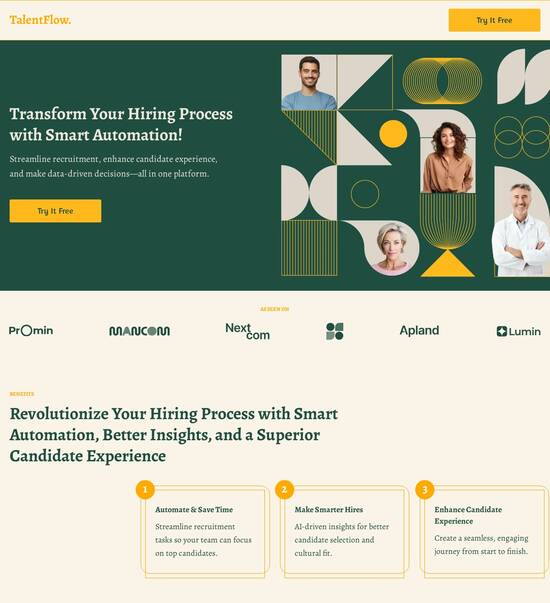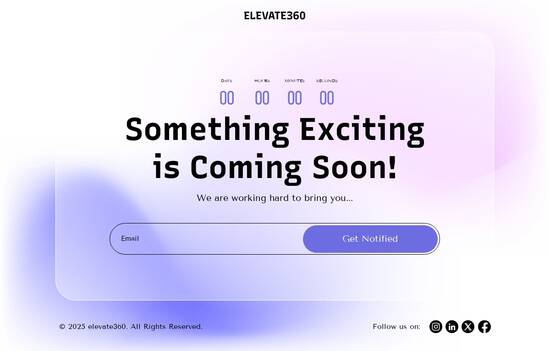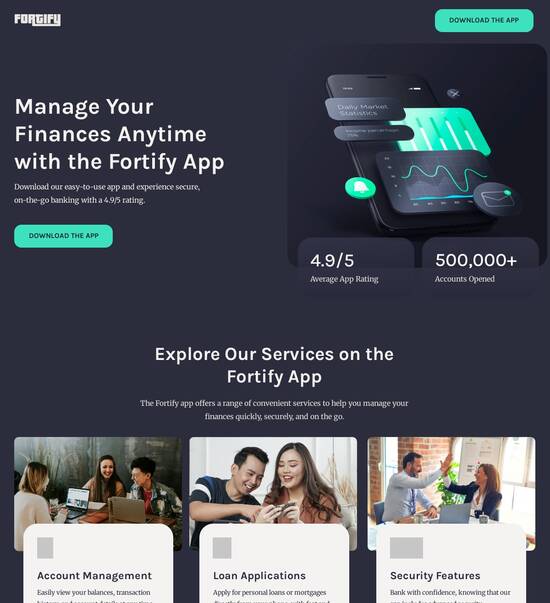
HTML5 optimized reservation page template
Explore Similar TemplatesAbout template
Supercharge your reservation page with HTML5 for outstanding performance! Learn more today.
Recommended templates

Easy to build without coding
With the intuitive drag-and-drop builder, anyone on your team can create high-converting pages without any knowledge of code or design. Make enhancements to your landing page with custom widgets using Javascript, HTML/CSS, or third-party scripts.

Multiple layouts for any industry and goal
Select from 500+ landing page layouts built to boost conversions across industry-specific scenarios. Customize them by adjusting fonts, adding images, and generating on-brand content with the AI assistant. Quickly scale with Instablocks® and Global Blocks that you can save, reuse, and update globally.

Loads fast and looks polished on any device
Every template is responsive, which means they present professionally on any device and load blazingly fast with our Thor Render Engine. You can also power them up with Google AMP technology to deliver an unparalleled mobile experience and drive higher conversions.

Robust analytics & experimentation
Get real-time updates and reporting across all your devices, showing the number of visitors, conversions, cost-per-visitor, and cost-per-lead. Launch AI-powered experiments, run A/B tests, and use heatmaps to analyze user behavior, then optimize your landing page to maximize conversions.







Easy to build without coding
With the intuitive drag-and-drop builder, anyone on your team can create high-converting pages without any knowledge of code or design. Make enhancements to your landing page with custom widgets using Javascript, HTML/CSS, or third-party scripts.
Multiple layouts for any industry and goal
Select from 500+ landing page layouts built to boost conversions across industry-specific scenarios. Customize them by adjusting fonts, adding images, and generating on-brand content with the AI assistant. Quickly scale with Instablocks® and Global Blocks that you can save, reuse, and update globally.
Loads fast and looks polished on any device
Every template is responsive, which means they present professionally on any device and load blazingly fast with our Thor Render Engine.
Robust analytics & experimentation
Get real-time updates and reporting across all your devices, showing the number of visitors, conversions, cost-per-visitor, and cost-per-lead. Launch AI-powered experiments, run A/B tests, and use heatmaps to analyze user behavior, then optimize your landing page to maximize conversions.
All the features you need to build lead-generating landing pages
Explore more featuresLearn how to build top-performing landing pages for any goal
FAQs
Leading the way in building high-performing landing pages





Mastering Your Campaigns with Instapage: The All-in-One Landing Page and CRO Platform
For marketers in the USA, particularly in business services, tech/SaaS, and education sectors, having an effective landing page is crucial. Instapage offers intuitive options to create high-converting pages that not only attract visitors but also maximize the return on investment (ROI). With a robust suite of tools at your disposal, learn how to supercharge your digital campaigns using landing pages optimized for conversion rates.
Why Instapage is the Best Choice for Marketers
Instapage sets itself apart in the realm of landing page and conversion rate optimization (CRO) platforms by providing both powerful features and ease of use. No matter your team’s size, Instapage allows you to launch high-quality landing pages that meet your specific marketing goals. Here’s a deeper look at why it’s highly regarded:
- 100+ high-converting templates: Tap into a vast library to streamline page creation, ensuring you never start from scratch.
- Built-in optimization tools: Utilize heatmaps and A/B testing to refine your pages for greater effectiveness.
- Dynamic personalization: Craft tailored experiences for different segments leveraging advanced data tools to track performance.
Step 1: Choosing the Right Template
Selecting a template that aligns with your campaign objectives is foundational. Instapage offers over 100 ready-to-use templates specifically designed for various industries, making it easier to start your project. Consider the following aspects when choosing:
- Alignment with brand identity: Ensure your template reflects your brand's image and message.
- Conversion goals: Pick layouts optimized for lead capture or sales conversions based on your marketing strategy.
- Mobile responsiveness: Select a template that looks great on all devices, particularly mobile.
Step 2: Customizing Your Landing Page
Once you've chosen a template, customization is key to ensuring your page resonates with the target audience. Instapage's platform facilitates easy modification through intuitive design tools. Here are specific areas to focus on:
- Brand visuals: Incorporate your logo, brand colors, and fonts to maintain consistency.
- Compelling headlines: Use powerful headlines that convey your offer clearly and spark interest.
- Effective calls-to-action: Position CTAs prominently and use actionable language that encourages engagement.
Step 3: Testing and Optimizing for Success
Once your landing page is live, ongoing testing and optimization are vital. Leverage Instapage's analytics dashboard to monitor performance, conduct A/B testing, and adjust your strategies accordingly. Focus on these key elements:
- Analytics usage: Regularly review metrics to understand user behavior and identify areas for improvement.
- A/B testing: Implement small changes incrementally to assess impact, ensuring that the most effective version remains live.
- Feedback loops: Gather insights from user interactions or surveys to enhance future designs.
In summation, Instapage provides an all-encompassing solution for creating effective landing pages that drive results. It empowers marketers to conceptualize, execute, and optimize with unprecedented efficiency.
Ready to elevate your marketing campaigns? Sign up for Instapage today and start creating stunning landing pages that convert!
People also ask about HTML5 optimized reservation page template
Exploring HTML5 optimized reservation page templates: The future of booking experiences
The significance of HTML5 in modern web design
HTML5 has revolutionized the landscape of web design by offering enhanced features over its predecessors. It marks a significant shift from HTML4 and XHTML, providing a more streamlined syntax and robust functionalities. Gone are the days of convoluted code, as HTML5 enables developers to create cleaner, more efficient web pages. This evolution is key, especially in fields such as travel, where user experience is paramount.
One of the standout benefits of HTML5 is its focus on improving user interaction. With native support for audio, video, and graphics, designers can create immersive experiences without relying heavily on external plugins. This not only improves load times but also enhances the overall aesthetic appeal of websites, making them more engaging for users. As a result, the use of HTML5 has surged, particularly for businesses in heavily competitive sectors like travel and hospitality.
Finally, the importance of responsiveness cannot be overstated in modern web design. With mobile internet usage surpassing desktop, travel websites need to adapt seamlessly across various devices. HTML5 enables responsive design elements that adjust automatically based on screen size, ensuring that travelers can easily access reservation pages from their smartphones, thus significantly enhancing their booking experience.
Key features of HTML5 optimized reservation page templates
HTML5 optimized reservation page templates offer a plethora of features that cater specifically to the needs of the travel industry. One of the most significant advantages is seamless integration with booking engines. This capability allows businesses to streamline reservations by allowing customers to check availability and book directly from the website, improving the overall user experience.
Another critical feature is mobile-friendly design. With more travelers using their mobile devices for bookings than ever before, templates optimized for HTML5 are crucial. These designs are specifically engineered to function flawlessly on smartphones and tablets, ensuring users can make reservations anytime, anywhere.
Dynamic content capabilities, including real-time availability updates and interactive maps.
Customization options for personal branding, allowing businesses to tailor their templates.
Built-in SEO benefits which can significantly enhance online visibility and discoverability.
User-centric design elements
User-centric design is pivotal for any successful reservation page. Intuitive navigation and clear user flow guide potential customers from exploration to booking effortlessly. An effective reservation template incorporates delete features that make re-engaging users a priority, ensuring they won't abandon the process due to confusion or frustration.
Prominent call-to-action buttons play a crucial role in directing user behavior. Strategically placed buttons enhance visibility and encourage customer actions. The reservation process can also be designed as multi-step to avoid overwhelming the user with information, thereby solidifying the booking experience. Furthermore, incorporating user feedback mechanisms, such as reviews and ratings, promotes trust and credibility, which are vital in the travel industry.
Industry applications: tailored templates for diverse needs
Various sectors within the travel industry can significantly benefit from tailored HTML5 optimized reservation templates. For instance, hotel website templates focus on showcasing room availability and amenities, elevating the guest experience by integrating high-quality visuals and user reviews.
Travel company platforms require comprehensive itinerary planning templates that not only allow for bookings but also enable users to customize their journeys. Similarly, resort templates can highlight amenities and activities, allowing potential guests to visualize their experience before making a reservation. Templates designed for bed and breakfasts emphasize a personal touch, offering a glimpse into local attractions that cater to unique experiences.
Hotel website templates offer beautifully designed layouts to enhance guest booking experiences.
Travel company platforms require templates that enable comprehensive itinerary planning.
Real estate site templates for vacation rentals must emphasize engaging property displays and easy booking capabilities.
Technical aspects: under the hood of HTML5 templates
Understanding HTML5 is crucial for developers working on reservation page templates. Compared to HTML4, HTML5 offers greater semantic structure, enhanced accessibility features, and improved error handling. These traits significantly impact how users interact with booking pages, thus elevating their usability.
Accessibility should be a priority, ensuring that all users can navigate and use the website effectively. This includes accommodating users with disabilities through features like ARIA roles and keyboard navigation. Furthermore, compatibility across browsers and devices ensures that no user is left out, regardless of their preferred technology. Lastly, security protocols for safe transactions must be robust, protecting user data and fostering trust.
The role of web designers in template customization
Web designers play a pivotal role in customizing HTML5 optimized reservation templates to fit specific business needs. Essential skills include familiarity with coding languages like HTML, CSS, and JavaScript, along with a keen understanding of user experience principles. This knowledge enables designers to create effective and aesthetically pleasing booking pages that enhance conversions.
Collaborative design processes with travel companies yield templates that meet real-world requirements, ensuring that the final product aligns with user expectations. Best practices in template customization involve balancing aesthetics with functionality, prioritizing the user experience while still meeting business goals. Regular feedback loops ensure that designs stay relevant and effective.
Case studies: success stories with optimized reservation page templates
Several successful implementations of HTML5 optimized reservation page templates illustrate their potential impact. For example, a hotel case study demonstrated that user experience enhancements directly correlated with increased bookings. A more intuitive layout, combined with personalized recommendations, significantly boosted conversion rates.
A travel company reported substantial revenue growth following the optimization of their reservation templates, which facilitated smoother navigation and quicker bookings. Similarly, a resort capitalized on interactive features, such as virtual tours and live booking calendars, leading to increased customer engagement and satisfaction.
The future of reservation systems in the travel industry
The travel industry is on the brink of significant transformations in reservation systems, and several emerging trends indicate where the future lies. Enhanced user experiences will continue to dictate design principles, with an emphasis on fast loading times, minimalistic interfaces, and seamless integration of various services.
Predictions also highlight the rise of automated booking processes, where artificial intelligence could assist users in making reservations tailored to their preferences. Moreover, the incorporation of augmented reality (AR) and virtual reality (VR) into the booking process holds vast potential for providing travelers with immersive previews of their trips.
Challenges to consider when implementing HTML5 templates
Despite their numerous advantages, implementing HTML5 optimized reservation page templates comes with challenges. Identifying user needs and behavioral trends is crucial for ensuring the template's design meets actual demands. Ongoing research into user preferences will be necessary to adapt effectively.
Ensuring quality performance across various devices is another hurdle that developers must navigate. With a multitude of screen sizes and operating systems in use, it is essential for designs to maintain functionality and appeal in all scenarios. Lastly, while customizing templates to include unique features, maintaining their integrity and usability should always be a priority.
Maximizing the benefits of HTML5 reservation page templates
To fully leverage the advantages of HTML5 optimized reservation page templates, businesses should adopt a comprehensive approach to user data analysis. Monitoring user interactions with booking systems provides insights that can drive continuous improvements, ensuring that the system evolves based on customer needs.
Incorporating feedback loops from customers can provide invaluable input for further enhancements, encouraging active participation from users in shaping the booking experience. Finally, digital marketing plays a critical role in boosting visibility, driving traffic to optimized templates, and elevating overall brand presence in the competitive landscape of the travel industry.
Practical steps for implementing HTML5 templates in your business
Implementing HTML5 optimized reservation templates requires thoughtful planning and execution. Start by choosing the right template that aligns with your business model and user needs, considering aspects like design aesthetics and functionality. Additionally, essential tools and resources for development include design software and coding equipment to facilitate smooth customization.
Testing methodologies should be established before launching the templates to ensure optimal performance. Conducting A/B tests can help identify elements that drive conversions, allowing for data-driven adjustments. A successful launch strategy emphasizes on-going monitoring of user interactions to continually refine and improve the booking experience.
Final thoughts: embracing innovation in travel booking solutions
As technology evolves, the opportunities to enhance travel booking solutions will continue to expand. HTML5 optimized reservation page templates represent a forward-thinking approach that prioritizes user experience through innovative designs and responsive features. For businesses moving into the future, embracing these advancements will be critical for maintaining relevance and fostering customer loyalty.
By focusing on continuous improvements in technology and user experience, industries can transform how customers engage with their booking processes, ultimately paving the way for an enhanced travel experience.
Ready to skyrocket conversions?
Supercharge your ad campaigns with high-performing landing pages
Get started














